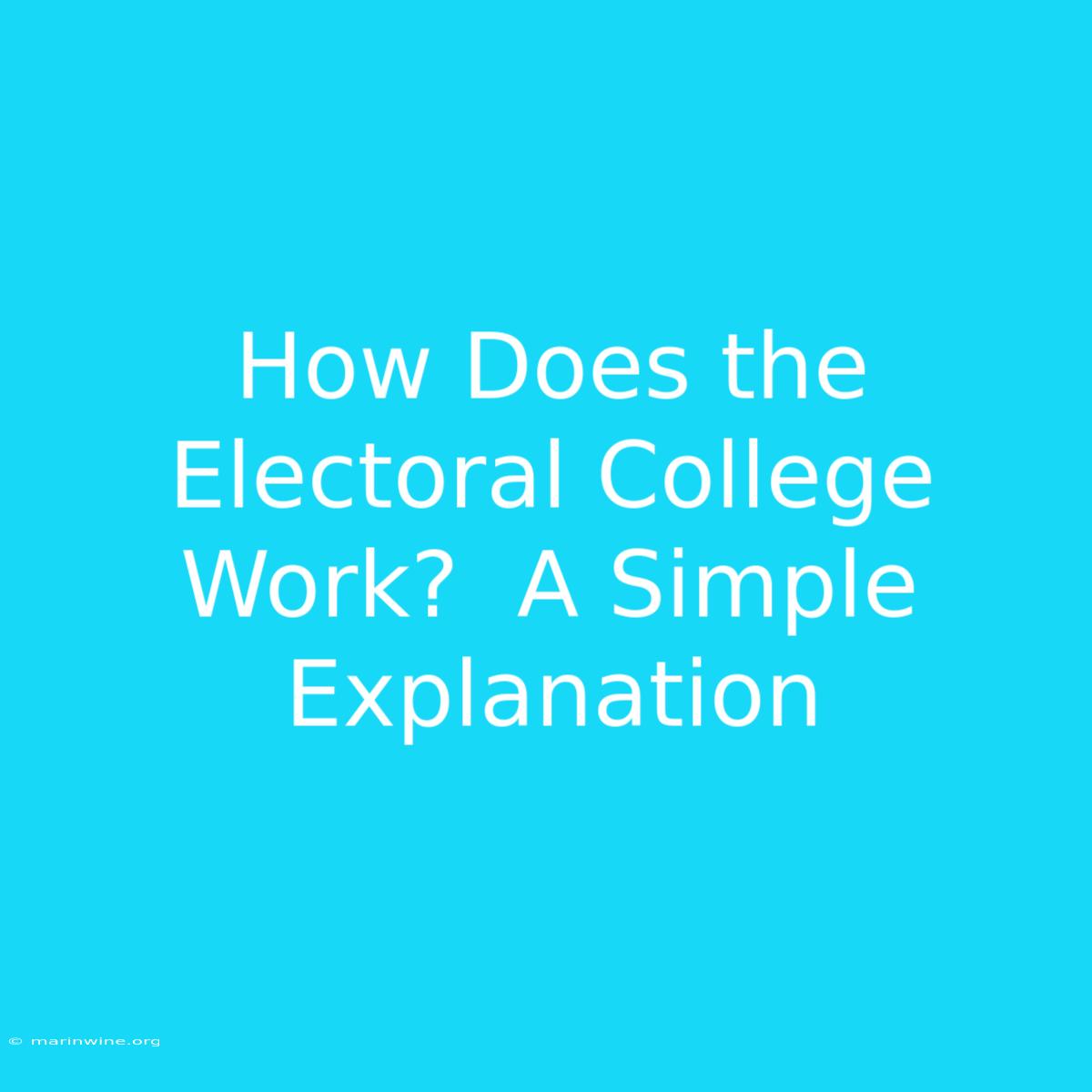How Does the Electoral College Work? A Simple Explanation
Have you ever wondered how the President of the United States is elected? It's not simply a matter of who gets the most votes nationwide! The Electoral College system, while often criticized, plays a pivotal role in determining the winner.
Why It Matters
Understanding the Electoral College is crucial because it impacts how presidential campaigns are run, how political power is distributed, and ultimately, who leads the nation. This article provides a straightforward explanation of this complex system.
Key Takeaways of the Electoral College:
| Key Takeaways | Explanation |
|---|---|
| Each state gets electors based on its population. | More people = more electors. |
| The candidate with the most votes in a state usually gets all of that state's electors. | This is the "winner-take-all" system. |
| A candidate needs 270 electoral votes to win the presidency. | This is a majority of the 538 total electors. |
The Electoral College System
The Electoral College is a group of electors chosen by each state to officially cast votes for the President and Vice President. Each state's number of electors equals its total number of representatives and senators in Congress. This means that larger states, with more people and therefore more representatives, have more electoral votes.
Here's a simplified example:
- California has 55 electoral votes, while Wyoming only has 3. This reflects the difference in their populations.
The "Winner-Take-All" System:
In most states, the presidential candidate who wins the popular vote in that state gets all of that state's electoral votes. This is known as the "winner-take-all" system.
Exception: Maine and Nebraska
Maine and Nebraska use a slightly different system, where the candidate who wins each congressional district gets one electoral vote, and the winner of the statewide vote gets the remaining electoral votes.
Electoral Votes and the Presidency:
A candidate needs 270 electoral votes to win the presidency. This is a majority of the 538 total electors.
Why the Electoral College?
The Electoral College was established by the Founding Fathers during the drafting of the U.S. Constitution. They believed that it would protect the interests of smaller states and prevent a few large states from dominating presidential elections.
Criticisms of the Electoral College:
The Electoral College has been criticized for a number of reasons, including:
- A candidate can win the presidency without winning the popular vote. This happened in 2000 and 2016.
- It can give more weight to votes in certain states. States with smaller populations can have a disproportionate impact on the outcome of the election.
- It can discourage voter turnout in some states. If a state is considered a "safe" victory for one party, voters in that state may feel that their vote doesn't matter.
Alternatives to the Electoral College:
Some people have suggested alternatives to the Electoral College, such as:
- A national popular vote system. The candidate who wins the most votes nationwide would win the presidency.
- A proportional system. Electoral votes would be awarded based on the percentage of the vote that each candidate receives in a state.
The Impact of the Electoral College
The Electoral College has a significant impact on presidential campaigns, forcing candidates to focus their attention and resources on certain key states known as "battleground states." These are states where the race is close, and the outcome can swing the election one way or the other.
Campaign Strategies:
Candidates must carefully consider their strategy for each state, tailoring their message and spending their campaign funds accordingly. The Electoral College system can influence candidates' choices about which issues to emphasize and which voters to target.
FAQ
Q: What if no candidate receives 270 electoral votes?
A: If no candidate receives 270 electoral votes, the election goes to the House of Representatives. Each state gets one vote, and the candidate who receives a majority of the votes (26 votes) wins the presidency.
Q: How are electors chosen?
A: Electors are typically chosen by the state political parties, often based on the results of the presidential election in that state.
Q: Can an elector vote for someone other than the candidate they were pledged to support?
A: This is called "faithless elector" voting. It is rare, but it does happen. There are some legal constraints on faithless elector voting, but it is not entirely prohibited.
Q: Why should I care about the Electoral College?
A: The Electoral College directly affects how the President is elected, influencing the strategies of candidates, the allocation of resources, and ultimately, who leads the nation. Understanding this complex system is key to understanding the workings of American democracy.
Tips for Understanding the Electoral College
- Pay attention to battleground states. These states will be heavily contested in each election.
- Learn about your state's electoral votes. How many votes does your state have?
- Think about how the Electoral College might affect the outcome of an election. Could a candidate win the presidency without winning the popular vote?
Summary of the Electoral College:
The Electoral College is a complex system that has been both lauded and criticized. It is a unique feature of the American political landscape, and understanding its workings is essential to understanding the process of electing a President.
Closing Message: The debate about the Electoral College is likely to continue for years to come. Ultimately, it's up to the American people to decide whether this system should be reformed or abolished.

